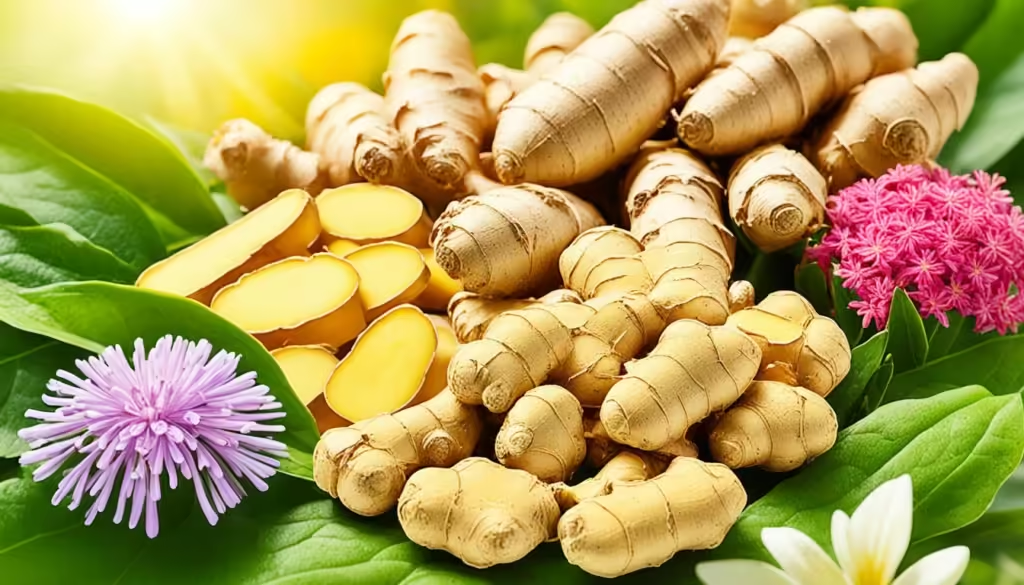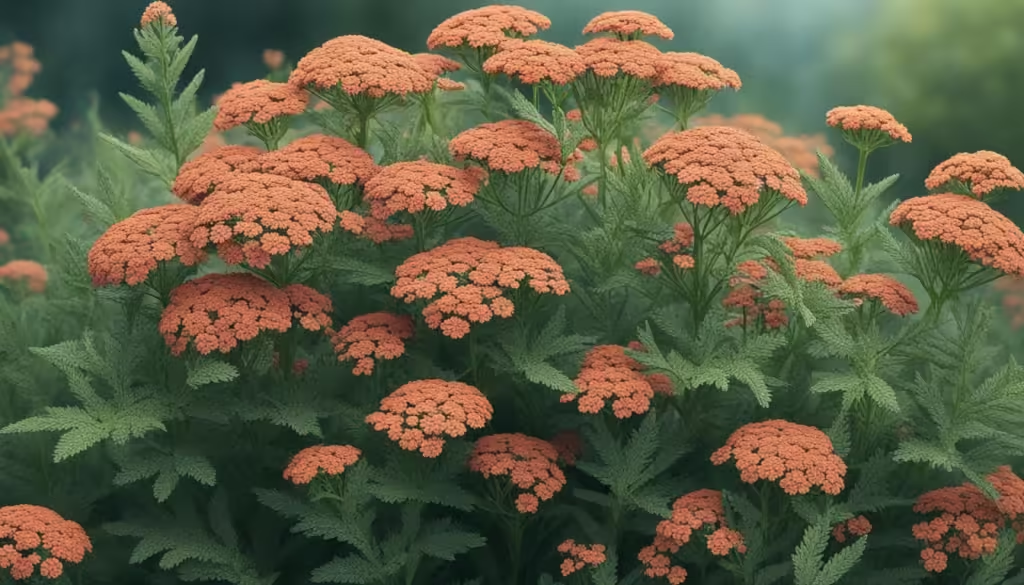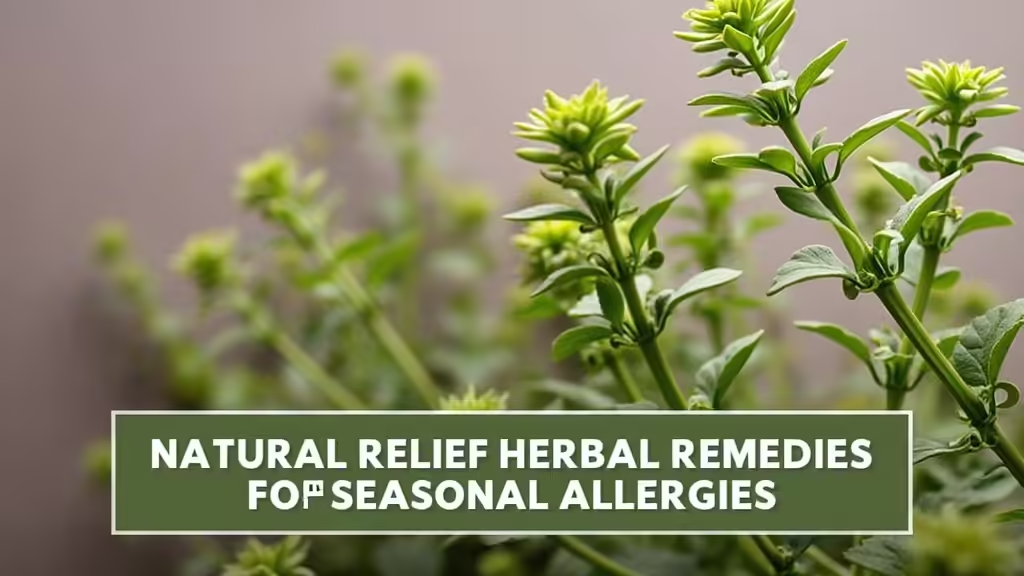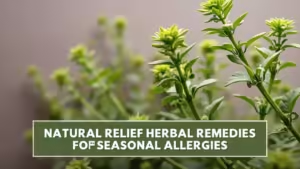Natural Relief: Herbal Remedies for Seasonal Allergies
Table of Contents
Are you tired of dealing with sniffles, itchy eyes, and other symptoms from seasonal allergies? While we can’t change the pollen count, there are natural ways to feel better. Have you thought about using herbal remedies to fight your allergies? This article will show you how plant-based remedies can help you find relief.

Key Takeaways
- Seasonal allergies affect over 60 million people in India each year.
- Herbal remedies can offer natural solutions to manage allergy symptoms.
- Incorporating holistic approaches can support overall health and well-being.
- Understanding the causes of allergies is the first step in finding relief.
- Exploring plant-based allergy fighters can provide an effective alternative to conventional treatments.
Understanding Seasonal Allergies
Seasonal allergies, also known as hay fever or allergic rhinitis, affect millions of people around the world. They happen when the body’s immune system overreacts to things like pollen or spores in the air. This leads to symptoms that are not pleasant.
What Causes Seasonal Allergies?
Many things can lead to seasonal allergies. Your genes can play a big role, making you more likely to have allergies if others in your family do. The time of year and where you live also matter. Different plants and pollen levels can cause allergies at various times and places.
Common Allergy Symptoms
- Nasal congestion
- Itchy, watery eyes
- Sneezing
- Coughing
- Headaches
- Fatigue
Knowing what causes seasonal allergies and their symptoms can help you manage them better. Being aware of your triggers and how you react can lead to better relief and a better life.
“Seasonal allergies can have a significant impact on a person’s daily life, but with the right approach, it is possible to find effective relief and manage the condition effectively.”
Herbal remedies for seasonal allergies
If you’re looking for natural ways to fight seasonal allergies, herbal remedies might help. These plant-based treatments can ease symptoms like stuffy nose, sneezing, and itchy eyes. They offer a holistic way to tackle allergies.
Stinging Nettle: Nature’s Antihistamine
Stinging nettle (Urtica dioica) is a strong natural antihistamine. It has compounds that lessen inflammation and offer relief. This herb is full of antioxidants, antimicrobial, and anti-inflammatory properties. It’s a great choice for those wanting a natural allergy relief.
Perilla: A Mint Family Powerhouse
Perilla (Perilla frutescens) is another herb to think about. It’s part of the mint family herbs. Perilla is good for treating nasal congestion, sinusitis, and other allergy-related irritation. It works by balancing the immune system and stopping the release of natural antihistamines. This helps ease common allergy symptoms.
Choosing stinging nettle, perilla, or other herbal remedies could change how you handle seasonal herbal remedies for allergies. Adding these natural antihistamines to your routine might bring relief from seasonal allergies.

“Herbal remedies can offer a natural approach to managing seasonal allergy symptoms.”
Sea Buckthorn: A Nutrient-Dense Ally
If you’re looking for natural ways to fight seasonal allergies, consider sea buckthorn. This shrub is full of over 190 nutrients and phytonutrients. It’s a great choice for boosting your health.
Sea buckthorn is loaded with organic acids, tannins, quercetin, and vitamins A, E, C, and B. It also has a lot of superoxide dismutase (SOD), an antioxidant that helps keep your lungs healthy.
Sea buckthorn can help ease allergy symptoms like congestion and cough. It does this by supporting your body’s defenses and reducing inflammation. Adding it to your diet can be a smart move against allergies.
“Sea buckthorn is a true treasure trove of beneficial nutrients for those dealing with seasonal allergies. Its anti-inflammatory and respiratory-supporting properties make it a must-try natural remedy.”
You can eat sea buckthorn or take it as a supplement to fight allergies. It’s packed with nutrients that support your respiratory health. Discover how sea buckthorn can improve your overall well-being.
Butterbur: An Ancient Herbal Remedy
Butterbur (Petasites hybridus) is a shrub-like plant that has been used for centuries in traditional medicine. It treats various conditions, including seasonal allergies. Recently, it has gained interest for its potential to ease allergy symptoms naturally.
Choosing Safe Butterbur Products
Studies show that butterbur extracts might work like antihistamines for hay fever. But, it’s key to pick your butterbur products carefully. The raw form has harmful compounds called pyrrolizidine alkaloids (PAs) that can hurt the liver.
To be safe, choose butterbur products labeled as PA-free. This ensures they are safe for use. High-quality, butterbur supplements, after thorough extraction and purification, can help manage seasonal allergies. They let you enjoy the benefits of this ancient remedy safely.
“Butterbur has been used for centuries to treat various conditions, including allergic rhinitis. When properly processed to remove pyrrolizidine alkaloids, it can be a safe and effective natural option for allergy relief.”

By picking PA-free butterbur products, you can try this ancient herbal remedy as a natural allergy treatment. Always talk to your healthcare provider before adding new supplements to your routine.
Ginger: A Versatile Herbal Solution
Ginger (Zingiber officinale) is a remarkable herb that helps those with seasonal allergies. It’s known for its culinary uses but also has anti-inflammatory and antiviral properties. These make it a natural antihistamine and immune booster.
Ginger can ease nasal congestion and headaches, offering allergy relief. Drinking ginger tea can clear your airways and ease allergy discomfort. Steaming ginger also helps by acting as a natural decongestant.
Ginger is versatile in its benefits. Its compounds, like gingerol and shogaol, fight inflammation in the nasal passages. This makes ginger a key natural ally against allergies.
“Ginger is a true powerhouse when it comes to combating seasonal allergies. Its multi-faceted benefits make it a must-have in any natural allergy relief arsenal.”
You can add ginger to your diet, brew tea, or use its aroma for relief from seasonal allergies. This versatile herb can change the game for those looking for natural allergy relief.

Yarrow: A Multi-Purpose Herbal Healer
Yarrow (Achillea millefolium) is a special herb that has been used for centuries. It helps with many health issues. Its strong antimicrobial and anti-catarrhal properties are great for fighting seasonal allergies, especially those that affect the lungs.
Yarrow can help with nasal congestion and sinus problems caused by allergies. It works like a natural antihistamine and decongestant. This makes it a big help for people with seasonal allergies.
Precautions for Using Yarrow
Yarrow is usually safe and effective, but there are some things to keep in mind. If you’re allergic to ragweed, be careful with yarrow. Also, don’t use it inside for more than two weeks because it can be quite strong.
But with care and advice from a doctor, yarrow can be a great choice for fighting allergies. It’s effective and can help with many respiratory problems. This makes it a true all-around herbal healer.

“Yarrow has been used for centuries to address a wide range of health concerns, including seasonal allergies and respiratory issues.”
Nasal Irrigation: A Simple At-Home Relief
If you’re dealing with seasonal allergies, a simple, natural solution might help. Nasal irrigation, also known as a saline rinse or nasal lavage, involves flushing your nasal passages with a sterile saltwater solution. This method clears out mucus and reduces inflammation, making it easier to breathe and offering relief from allergies.
You can do nasal irrigation at home with a neti pot, squeeze bottle, or bulb syringe. Always use purified or distilled water to prevent infection. Adding this to your daily routine can be an easy and cheap way to fight allergies.
- Fill your neti pot, squeeze bottle, or bulb syringe with a saline solution made from purified water and a pinch of salt.
- Lean over a sink and gently insert the tip of the device into one nostril, tilting your head to the side.
- Slowly pour or squeeze the solution into your nostril, allowing it to flow through and out the other nostril.
- Repeat the process on the other side, then blow your nose gently to clear any remaining mucus.
Adding nasal irrigation to your routine can be a simple yet effective way to find natural allergy relief. By using a saline rinse, you can clear out irritants and reduce sinus flush. This leads to better breathing and overall well-being.
“Nasal irrigation is a safe, inexpensive, and effective way to manage allergy symptoms without the need for medications.”

Always talk to your healthcare provider before trying new allergy treatments, including nasal irrigation. With some practice, this simple technique can become a key part of fighting allergies.
Boosting Immunity with Vitamins
Keeping your immune system strong is key to handling seasonal allergies. Vitamins like vitamin C and vitamin D are important for fighting allergies and keeping your immune system healthy.
The Role of Vitamin C
Vitamin C is a strong antioxidant that can lessen inflammation and reduce histamine levels. This can help ease allergy symptoms. Even though studies on vitamin C and allergies are not clear-cut, it’s still vital for a healthy immune system.
Vitamin D and Allergy Relief
Not having enough vitamin D can make you more likely to get allergies. This vitamin helps control how your immune system works. Taking vitamin D supplements can help your body handle allergic reactions better.
Eating more vitamin C and vitamin D or taking supplements can help manage allergies. These nutrients can gently boost your immune system and ease seasonal allergy symptoms.
| Nutrient | Benefits for Allergy Relief | Food Sources |
|---|---|---|
| Vitamin C | Reduces inflammation, limits histamine response | Citrus fruits, bell peppers, broccoli, strawberries |
| Vitamin D | Regulates immune system function, may enhance allergy management | Fatty fish, egg yolks, fortified dairy products |

“Incorporating more vitamin C and vitamin D into your diet can be a powerful way to support your body’s natural defenses against seasonal allergies.”
Natural Sweetness: Honey and Propolis
The humble honey and its byproduct, propolis, are great for natural allergy relief. These bee-derived items are tasty and have properties that help with allergies and immune support.
Honey is packed with compounds that fight inflammation and boost your immune system. Some studies say that using honey-based nasal sprays or eating local honey can ease allergy symptoms. These symptoms include sneezing, itchy eyes, and stuffy nose. The idea is that eating local pollen through honey helps your immune system get used to it. This is a gentle way to fight allergies.
Propolis, another bee product, could also help with allergies. It’s a sticky substance made by bees that fights inflammation and helps the immune system. While we need more studies, adding honey and propolis to your daily life might ease allergy symptoms.
| Honey | Propolis |
|---|---|
| Contains compounds that may reduce inflammation Supports immune function May provide relief from allergy symptoms | Exhibits anti-inflammatory properties Possesses immune-modulating effects Potential benefits for allergy sufferers |
Adding honey or propolis to your diet or using them on your skin could be a tasty way to fight allergies. These natural remedies might help you feel better and support your immune system.

“Honey is a natural, gentle way to find relief from seasonal allergies.”
Acupuncture: An Ancient Approach
Looking for natural ways to fight seasonal allergies? Consider acupuncture, an ancient practice from Chinese medicine. It’s been around for centuries, helping with symptoms like nasal congestion and itchy eyes.
Though we don’t fully understand how it works, studies hint it might help control the immune system and ease allergy symptoms. Many people find relief with acupuncture treatments. It’s often used along with regular treatments.
Acupuncture involves putting thin needles on certain body points. These points aim to balance the body’s energy, or “qi.” It’s a safe option when done by a trained practitioner, making it a good choice for natural allergy relief.
“Acupuncture has been used for centuries to treat a variety of health conditions, including seasonal allergies. While the scientific evidence is still evolving, many allergy sufferers have reported finding relief through this ancient practice.”
If you’re thinking about trying acupuncture for your allergies, find a skilled practitioner. They’ll create a plan just for you. Mixing acupuncture with other natural remedies might help you feel better.

Conclusion
Seasonal allergies can really get in the way of your life. But, there are many natural ways to help you feel better. By understanding what causes your allergies and using herbal remedies and other natural options, you can fight your symptoms and boost your health.
While traditional medicines are important, trying these natural methods can offer lasting relief without side effects. Things like stinging nettle and vitamin C can help fight inflammation and boost your immune system. Ginger can soothe you, and yarrow can help clear your sinuses.
By changing your lifestyle and adding these natural remedies to your daily routine, you can enjoy the seasons without the misery of allergies. Use herbal remedies and a holistic approach to take control of your health. This way, you can live a happier, healthier life.
FAQ
What are the most common symptoms of seasonal allergies?
Seasonal allergies often cause itchy, watery eyes, sneezing, coughing, and stuffy noses. You might also have a runny nose and feel like mucus is running down the back of your throat.
How can herbal remedies help provide relief for seasonal allergies?
Herbs like stinging nettle, perilla, and sea buckthorn can lessen inflammation. They work as natural antihistamines and help support the immune system. This can ease allergy symptoms.
Is nasal irrigation an effective home remedy for allergies?
Yes, using a saline solution to rinse your nose can clear out mucus. It also reduces swelling in the nasal passages. This can offer natural relief from allergies.
How can vitamins like C and D help manage seasonal allergies?
Vitamin C fights inflammation and vitamin D helps keep the immune system working right. Both can be good for people with seasonal allergies.
Can natural sweeteners like honey and propolis offer any allergy relief?
Some studies show honey and propolis might lessen inflammation and affect the immune system. This could help ease allergy symptoms.
Is acupuncture an effective complementary therapy for seasonal allergies?
The science is still growing, but many people find acupuncture helpful. It’s often used along with regular treatments for allergies.
Source Links
- https://www.dedicated.care/articles/best-natural-remedies-seasonal-allergies
- https://www.sinusandallergywellnesscenter.com/blog/allergic-rhinitis-6-herbal-remedies-to-try-sinus-allergy-wellness-clinic
- https://www.verywellhealth.com/natural-allergy-remedies-89245
Share this content:




Post Comment